Do you have a fire pit or fireplace? If yes, what do you do with the remaining charcoal after using any of the two? My guess is that you gather it up and throw it away. This is why would should have charcoal around the property.
After reading this, you’ll want to scatter charcoal throughout your home instead of throwing it away because these uses will blow your mind.
What is Charcoal?
Charcoal is the black carbon residue you get after heating wood (or other plant and animal materials) in an oxygen-restricted environment. As it burns, wood releases all the water and sap and neutralizes toxins. What is left behind is pure ash, carbon, and potassium.
There are different types of charcoal like activated charcoal, which has a lot of health benefits, and charcoal briquette, which is great for outdoor cooking.
But today, I’ll be talking about the common charcoal you get after heating wood without additives.
Related: 30 Survival Uses For Wood Ashes You Never Thought Of
Charcoal Around The Property: How To Use It
Supercharging Compost
Charcoal is high in carbon, which makes it an excellent addition to compost. Just sprinkle some on each layer. This helps distribute nutrients and speeds up the breakdown of materials.
Charcoal also neutralizes acidic items, such as pineapple peels. Plus, it absorbs odors and gases, keeping your compost fresh.
Initially, your compost pile will need extra water because charcoal soaks up moisture. But here’s the good part: as the compost heats up, the charcoal releases that moisture. This keeps everything working smoothly and helps reduce any bad smells that can form in the pile.
Just remember that for the microorganisms to be efficient at their job, your heap will need water, oxygen, and food from the biomass.
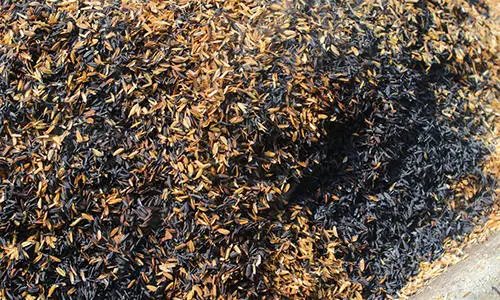
Soil Conditioner
Charcoal is rich in potassium, making it an excellent soil conditioner. It can also replace lime as a soil additive.
Sterile charcoal is a great amendment for all soil types. In sandy soil, it improves nutrient retention and moisture. It also enhances particle aggregation and reduces erosion.
For clay soil, charcoal improves drainage and air circulation. It also makes the soil easier to work with. In any type of soil, it reduces compaction. This leads to healthier soil and better crops, vegetables, and plants. We highly recommend these plants for clay soil.
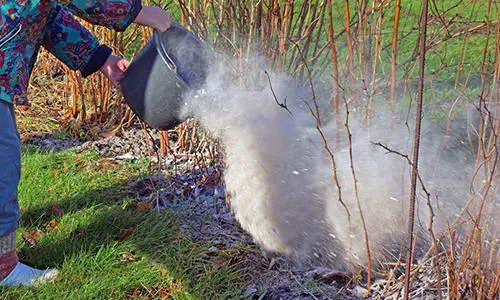
Charcoal Around The Property: Neutralize Soil Poisons
Some trees, like walnut trees, produce toxic hormones that get into the soil by leaves that wither and fall to the ground. If you want to plant anything around these trees, they will die.
To neutralize the soil poisons, you should add charcoal to the soil to absorb the poison before planting anything.
Pesticide Removal and Cleanup
Charcoal’s natural ability to absorb toxins makes it ideal for neutralizing the harmful effects of pesticides.
Activated charcoal works especially well due to its fine particles. If activated charcoal isn’t available, you can crush regular charcoal into smaller pieces to achieve a similar effect.
To treat pesticide buildup, combine one pound of charcoal with a gallon of water and mix thoroughly. This solution can cover 100 to 150 square feet of soil. For larger areas, you might want to spray the mixture evenly over the affected space for the best results.
Charcoal Around The Property: Mulch
You don’t always need plant material to mulch. You can use charcoal, which can be just as effective, if not more.
Charcoal mulch forms a protective layer on soil, locking in moisture and eliminating odors from decaying plants.
It also blocks weed growth and enhances the look of your garden. Around light-colored plants, it adds contrast, making their colors pop for a fresh, vibrant appearance.
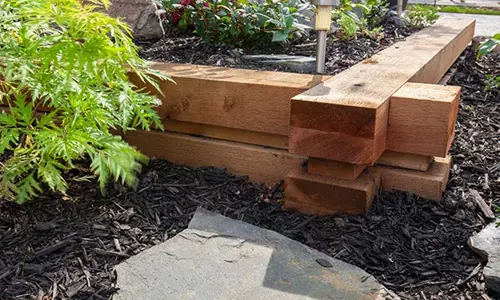
Organic Insect Killer
Natural powdered charcoal is extremely effective at eliminating odors and killing soft-shelled invertebrates like termites, ants, beetles, and snails. Sprinkling this powder around your garden will kill pests without leaving behind toxic residue.
As rain dilutes the charcoal, be sure to reapply it regularly.
Related: Most Threatening Insects You Should Keep Away From Your Garden
Charcoal Around The Property: Uses For Your Fridge
Some homesteaders in rural areas without access to electricity, like Amish people, use an energy-free charcoal chamber to keep fruits and vegetables fresh for weeks. This simple yet effective method slows down spoilage and gives them more time to sell their produce by maintaining cooler temperatures.
Heat is one of the main reasons food goes bad. For example, ripe tomatoes typically last only about four days in warm conditions. However, placing them in a charcoal chamber can extend their shelf life by over 30 days.
This works because charcoal is a poor conductor of heat and has unique absorption properties that block heat from passing through. As a result, the air inside the chamber stays cool, creating the perfect environment to preserve fruits and vegetables for longer periods.
If you live in a rural area, especially one without electricity, having a charcoal cooler can be a game-changer. It not only extends the lifespan of your produce but also reduces food waste, saving both time and money.
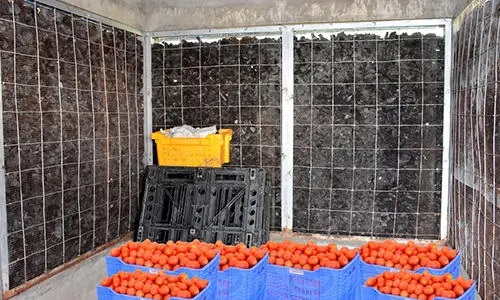
Keep Air Fresh
When wood burns, charcoal becomes porous. This allows it to absorb odors, chemicals, and nutrients, as well as unwanted smells in the air.
If you notice musty or unpleasant smells in your oven, basement, storeroom, cellar, or fridge, charcoal can help.
Here’s how to use it: Take a plastic bottle and add pieces of charcoal inside. Close the bottle and poke a few holes in it. Then, place the bottle in the smelly area. The charcoal will absorb odors and leave the space fresh and clean.
Just make sure to keep the bottle out of reach of children and pets.
Charcoal Around The Property: Use It For Animal Feed
Adding a small amount of charcoal to animal feed can improve their health and productivity. This means better conversion of feed into milk or meat.
You can use activated charcoal or crush regular charcoal into powder. Add it in small amounts to livestock feed. The charcoal absorbs toxins and reduces greenhouse gases.
Instead of releasing harmful gases, the charcoal traps methane produced by the animals. This methane is then disposed of as manure. The manure, enriched with these elements, helps improve soil quality and adds nutrients.
Some homesteaders worry about overusing charcoal in animal feed. Overuse can make livestock tolerate lower-quality feed, so it’s important to use it in moderation.
Related: Never Feed This To Your Livestock!
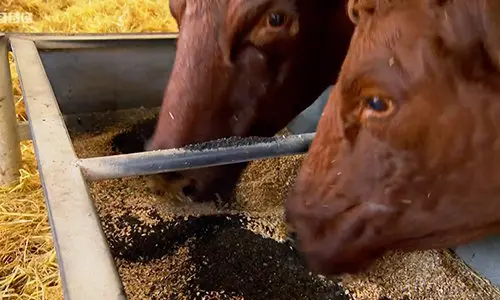
Keep Tools Clean and Rust-Free
Charcoal can help keep your tools clean and rust-free. Simply place a few chunks of charcoal wherever you store your hammers and nails. Its ability to absorb moisture will prevent rust from forming.
The same goes for garden tools – adding charcoal to your storage area will absorb moisture and prevent oxidation, keeping your tools sharp and rust-free.
So, what’s your favorite way to use charcoal? Let us know in the comments! And remember, you can get creative with how you use charcoal around your home to maximize its benefits.
You may also like:
 What Happens If You Ash Your Garden
What Happens If You Ash Your Garden
The Biggest Medicinal Mistakes You Can Make in a Blackout (Video)
Cheap Ways To Get Rid Of Invasive Ants
How To Build Your Own Wall Hanging Can Rotator
6 Things You Need To Do Before The Upcoming Crisis



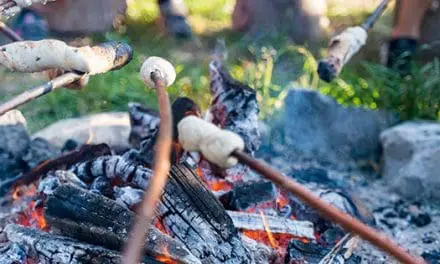

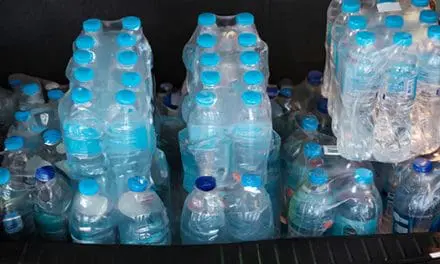
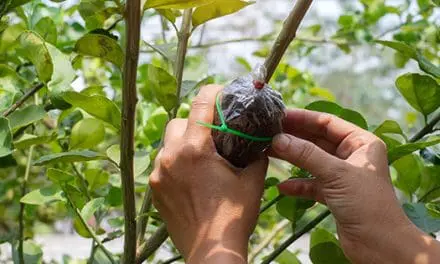







Just wondering if there is a difference between charcoal and ash? I assumed what was left behind in my stove or fire pit was ash.
I am wondering this as well
I use it both as charcoal and ash (for gardening/vegetables),
I also found related articles right on this website: https://selfsufficientprojects.com/what-happens-if-you-ash-your-garden/ and https://selfsufficientprojects.com/30-survival-uses-for-wood-ashes-you-never-thought-of/
Is it ONLY wood charcoal that can get rid of soft shell invertebrates or can you also us charcoal dust from charcoal briquets used for grilling food?